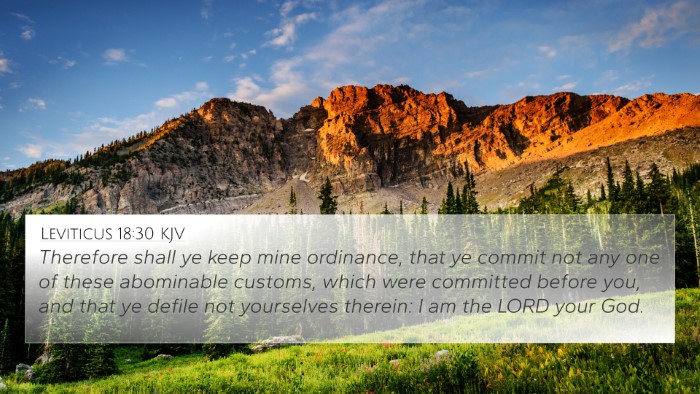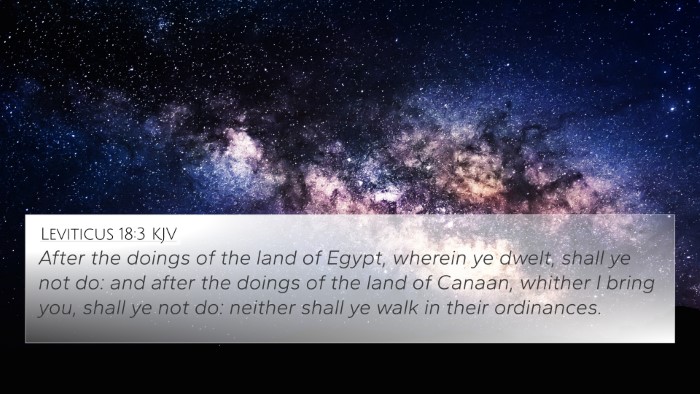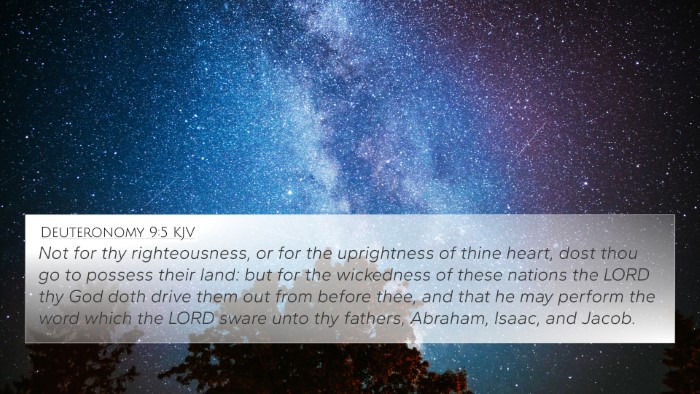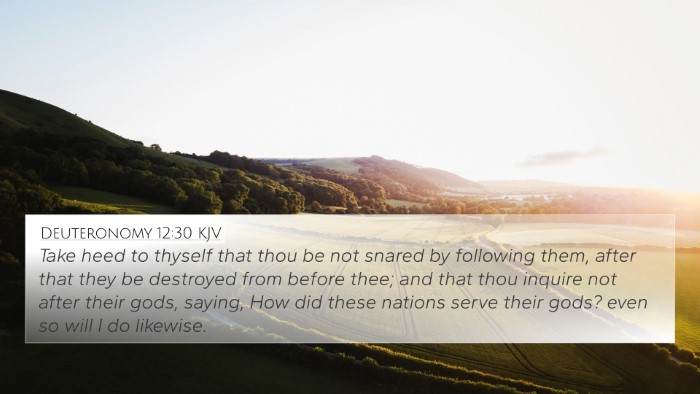Understanding Leviticus 20:23
Leviticus 20:23 states, "And you shall not walk in the customs of the nation that I am casting out before you, for they did all these things, and therefore I detested them." This verse emphasizes the importance of adhering to God's commandments while warning against adopting pagan practices. Both Matthew Henry and Adam Clarke offer profound insights that help unpack the meaning of this scripture.
Interpretative Insights
The essence of this verse highlights God's call for holiness among His people, distinguishing them from surrounding nations.
-
1. Call for Distinction:
According to Matthew Henry, this verse emphasizes the necessity for the Israelites to remain separate from the idolatrous customs of neighboring nations. Henry stresses that God's people should reflect His holiness in their conduct, avoiding any resemblance to those who do not follow Him.
-
2. Divine Displeasure:
Albert Barnes points out that God's detestation of the practices of other nations serves as a warning. These customs led to moral decay and divine judgment, reinforcing the importance of maintaining purity in worship and lifestyle.
-
3. Theological Context:
Adam Clarke reminds us that this is part of a larger covenant relationship God has with Israel, wherein they were to be His chosen people. Their identity required them to shun the wicked ways that led to their eventual expulsion from the Promised Land.
Biblical Applications
This verse serves as a relevant reminder of the need for believers today to examine their lives for any influences that stray from God's will.
- Maintaining Holiness: Just as ancient Israel was called to avoid pagan customs, contemporary Christians are challenged to reject societal norms that contradict biblical values.
- Consequences of Idolatry: The detestable practices of the nations remind us that idolatry in any form can lead to divine judgment. This necessitates a vigilant approach to one's own spiritual walk.
- Separation from Sin: Engaging with worldly values without discernment can compromise a believer’s witness and spiritual integrity.
Cross-References
Leviticus 20:23 connects powerfully with several other biblical passages, enhancing the understanding of its message. Here are some key cross-references:
- Jeremiah 10:2: "Thus says the Lord: Do not learn the way of the nations, nor be dismayed at the signs of the heavens, for the nations are dismayed at them."
- 2 Corinthians 6:17: "Therefore go out from their midst, and be separate from them, says the Lord, and touch no unclean thing; then I will welcome you."
- Romans 12:2: "Do not be conformed to this world, but be transformed by the renewal of your mind..."
- Exodus 23:24: "You shall not bow down to their gods, nor serve them, nor do as they do..."
- 1 Peter 1:16: "Since it is written, 'You shall be holy, for I am holy.'
- Deuteronomy 12:30: "Take care that you are not ensnared to follow them..."
- Ephesians 5:11: "Take no part in the unfruitful works of darkness, but instead expose them."
Concluding Thoughts
In light of Leviticus 20:23, believers are reminded to evaluate their practices and associations, ensuring they reflect God's will and intentions. This verse is crucial in understanding the broader theme of separation from sin and the call to holiness in the believer's life. The connections between Bible verses deepen our understanding of these divine principles.
Using tools for Bible cross-referencing, such as a Bible concordance or a cross-reference Bible study guide, can help one explore and identify further connections across scripture, enriching one’s understanding of biblical teachings. For example, how to use Bible cross-references can illuminate similar themes found throughout both the Old and New Testaments, showcasing the cohesive narrative of God's redemptive purpose.











